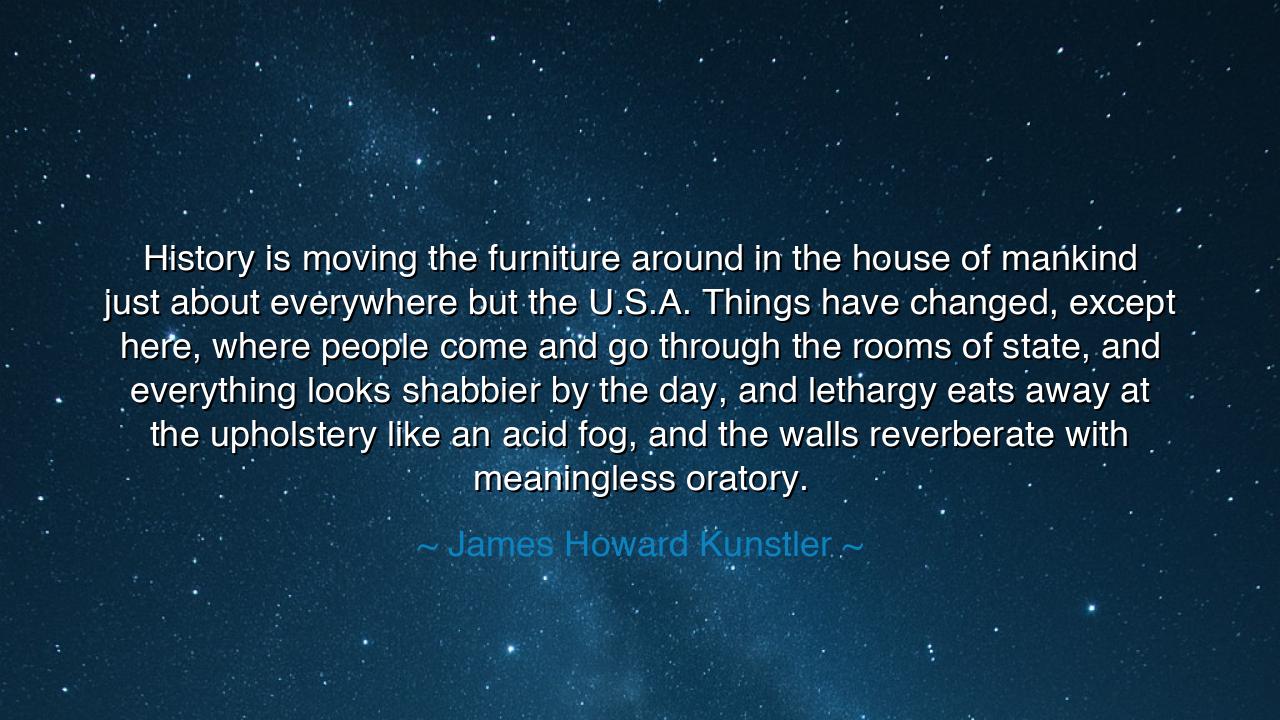
History is moving the furniture around in the house of mankind
History is moving the furniture around in the house of mankind just about everywhere but the U.S.A. Things have changed, except here, where people come and go through the rooms of state, and everything looks shabbier by the day, and lethargy eats away at the upholstery like an acid fog, and the walls reverberate with meaningless oratory.






The writer and social critic James Howard Kunstler once declared: “History is moving the furniture around in the house of mankind just about everywhere but the U.S.A. Things have changed, except here, where people come and go through the rooms of state, and everything looks shabbier by the day, and lethargy eats away at the upholstery like an acid fog, and the walls reverberate with meaningless oratory.” These words resound like a trumpet in a sleeping city, a lament and a warning both. Kunstler speaks not merely of a nation, but of a civilization grown weary, a people lulled into complacency while the great tides of change sweep past their shores. His imagery—the house of mankind, once proud, now crumbling with neglect—reminds us that no empire remains eternal when its inhabitants mistake comfort for strength and noise for purpose.
The house in his metaphor is civilization itself: the shared dwelling of humanity, built over millennia by the labor, wisdom, and sacrifices of countless generations. In it, each nation is a room—some bright with new beginnings, others dimmed by decay. Kunstler observes that the furniture of this great house—its systems of belief, its economies, its moral arrangements—is being rearranged across the world. Old powers wane, new ones rise, and the winds of transformation shake every foundation. Yet, in his eyes, the United States, once a beacon of vitality and invention, stands still, lost in its own corridors, unable or unwilling to face the necessity of renewal. The house decays not from assault, but from apathy.
Such decline is not new in the chronicles of man. History bears witness to countless houses that once gleamed with grandeur, only to crumble into dust when their people mistook stagnation for stability. Consider the Byzantine Empire, which for centuries outlasted its rivals in a glittering paralysis. Its palaces were adorned with gold, its ceremonies precise, but beneath the gilded domes, rot had taken hold. The citizens spoke endlessly of their glorious past while their borders shrank and their spirit waned. When at last the walls of Constantinople fell, they fell not from lack of stone, but from lack of soul. Kunstler’s words carry this same echo: that the greatest danger to a nation is not the enemy without, but the lethargy within.
He writes of meaningless oratory, the hollow speeches that fill the air when true conviction has departed. Words, once instruments of creation and guidance, become mere performances in the theater of decline. The walls reverberate, he says, with empty rhetoric—voices that speak of greatness but act in vanity, that proclaim progress while decay creeps unseen. The imagery of upholstery eaten by acid fog is the slow, invisible corrosion of ideals: the public trust, the moral courage, the civic virtue that once bound a people together. When these are dissolved, what remains is a shell—a house haunted by the ghosts of its former occupants.
And yet, within Kunstler’s lament lies a deeper challenge. He does not call for despair, but for awakening. The house of mankind can still be repaired; the decay is not destiny, but neglect. The cure for lethargy is participation, the antidote to meaninglessness is truth. The ancients would have called this “rekindling the civic fire.” For a people to remain alive, they must not only dwell in their inheritance—they must renew it. They must see their house not as a monument to the past, but as a living structure, in constant need of tending. Every generation must rearrange its own furniture, reexamine its values, rediscover its purpose.
Consider the Renaissance, when Europe emerged from centuries of torpor into light. It began not with kings or armies, but with thinkers and artists—men and women who refused lethargy, who looked upon the ruins of their world and chose to rebuild. Their courage to think anew—to question, to create, to move the furniture of thought and art—breathed life into a continent that had grown stale. Such is the call implicit in Kunstler’s words: that renewal begins with the individual who refuses to sleep through the slow erosion of meaning.
Therefore, the lesson is this: Do not let the house of your civilization—or of your soul—fall into neglect. When you see the paint peel, repair it; when the walls echo with empty words, speak truth; when comfort lulls you, rise and act. Every nation, every life, must be reimagined, or it will decay beneath its own stillness. Kunstler’s warning is not only for the United States but for all who grow complacent in prosperity. For history, like a restless tenant, will move the furniture with or without our consent. Let us, then, be the ones who move it with intention—who cleanse the fog of apathy, who polish the walls of reason, and who fill the house of mankind once more with living voices.






AAdministratorAdministrator
Welcome, honored guests. Please leave a comment, we will respond soon